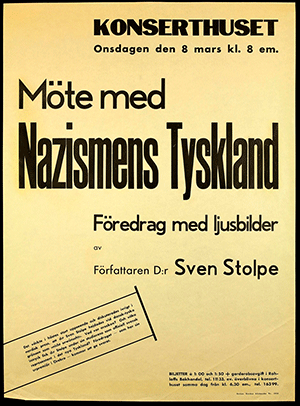Nordic Writers and Nazi Cultural Politics
Open keynote by Frederik Forrai Ørskov, PhD, UCPH.
 How did the National Socialist regime, infamously wary of cultural modernism and avant-garde art, pursue international cultural relations and for what purposes? Which kind of alternative internationalist visions and institutional infrastructures to the modernist literary mainstream did Nazi cultural politics aim at, and how did they relate to other forms of literary internationalism? What was the role envisioned for the Nordic countries, and how did Nordic writers respond to their supposed role in such visions as well as the opportunities and challenges they presented them with?
How did the National Socialist regime, infamously wary of cultural modernism and avant-garde art, pursue international cultural relations and for what purposes? Which kind of alternative internationalist visions and institutional infrastructures to the modernist literary mainstream did Nazi cultural politics aim at, and how did they relate to other forms of literary internationalism? What was the role envisioned for the Nordic countries, and how did Nordic writers respond to their supposed role in such visions as well as the opportunities and challenges they presented them with?
This talk will address these questions with the German-Nordic Writers’ House in Travemünde as its main example, while also exploring the role of Scandinavian literature in Nazi Germany as well as other institutions facilitating National Socialist and Fascist literary internationalism. It argues that the question of whether to remain observers while the political drama played out in front of their eyes or take a stance against radical political regimes, potentially at significant economic cost, became urgent for Nordic intellectuals, challenging individual writers and their organisations not just on their consciences and political beliefs but also on their understandings of their craft.
Bio
Frederik Forrai Ørskov is a postdoc at the Nordic Humanities Center, UCPH. As a historian, he has explored cultural and political relations between the Nordic countries and National Socialist Germany, including in the spheres of tourism and cultural diplomacy. In his PhD dissertation from the University of Helsinki and his recently published monograph, National Socialist Cultural Diplomacy: Culture, Politics, and Comradeship at the Nordic-German Writers’ House, 1934-1939 (Routledge), he has analysed relations between the Nordic literary sphere and the Third Reich through the prism of the German-Nordic Writers’ House in Travemünde in the 1930s, a cultural diplomatic enterprise initiated by Nazi Germany. Among other things, he has focused on the tensions that National Socialist culture politics produced for the Nordic writers involved with Nazi cultural diplomacy.
The keynote is part of the workshop The Avant-Garde and Totalitarian Cultural Politics organised by the explorative research network The 1930s Today – The Avant-Gardes in Times of Political Escalation.
The network is funded by the Independent Research Fund Denmark.
Map of South Campus
View directions.
View on map of the Faculty of Humanities - South Campus.
View map of South Campus (pdf).
